Monday, May 02, 2005
Nonsense, Language, and the Balkans

The view from our window in Bosnia
There is no such thing as an isolated humanist
-Edward Said
Jazz is something Negroes invented, and it said the most profound things -- not only about us and the way we look at things, but about what modern democratic life is really about. It is the nobility of the race put into sound ... jazz has all the elements, from the spare and penetrating to the complex and enveloping. It is the hardest music to play that I know of, and it is the highest rendition of individual emotion in the history of Western music.
-Wynton Marsalis

The wine the morning after, leaving the ferry
Sitting at a long table full of friends at Los Bravos, my friend Will Cathcart and I were telling a story about spending Easter in
Ironically, in this case, that meant we were keeping close to the plan. Will and I had made a vow to each other that we wouldn’t plan too much in advance, and we’d just sort of go with the flow. Thusly, the fact that we were on our way to Ancona―a city about a hundred or so miles north of our intended destination, Bari―was something to be admired. I have to say, we were doing a pretty bang-up job―it was day one, we were already several hours late and several hundred miles off course, which meant we were going to land in Croatia several hundred miles north of our target in Dubrovnik. We had to hitchhike to the ferry after walking for half an hour on the highway, and we ended up running to the door of the ferry as it was closing.
That night, on the ferry, we met four Italian ladies who spoke no English and a little French, yet—in normal Italian fashion—they talked to us anyway as if we were Italians and invited us to come with them to a small town in
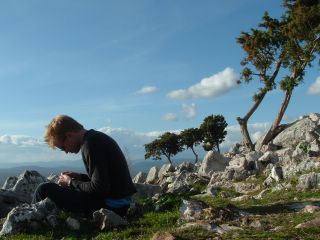
Will on Mt. Crznika
For the next three days, our little adventure took two awkward Protestant kids, Will and I, to a Catholic holy site in a foreign country that we had heard of only on the nightly news when we were children. We did a lot of wandering, visited the town music shop filled only with pirated DVDs and CDs, climbed the famous Mount Crnica―where the apparitions are said to have occurred―and sat up there for several hours looking out across Bosnia.
Will bought a phone card and called his dad for the fun of it:
“Hey. Dad? Hey. Yeah, it’s me. Will! Can you hear me? Hey, we’re in
Then it was my turn, and Will―trying to maintain some sense of normality―even managed to incense his ever growing hatred for inanimate objects after an unpleasant run-in with a post-office computer that didn’t end happily. His outburst took place as I was sending a one-line email to my family saying,
Hey, Mom and Dad, we ended up in
Love, Robo
.
Now, nearly a year later, back at Los Bravos in Clemson, Will and I were recounting the less-than-serious conversation we had on the way down from Mt. Crnica that involved us getting caught up in an elaborate CIA plot to assassinate Slobodan Milosevic before his trial which was just getting started.
When we finished the story, a friend said jokingly that we would make good CIA agents, because no one would expect it. After I said that I wouldn’t be to keen on being a CIA agent, she responded, “Yeah, me neither, I could never do something so unpatriotic. We should all be faithful to our country.” I didn’t ponder for a second the peculiarity of that particular comment; I don’t think I even skipped a beat.
“I don’t believe in countries or borders. They’re not real,” I said, taking in a deep breath right afterwards, as though I was trying to suck the whole comment out of the air before they heard it. If I had learned anything from the news or books on “Anti-Americanism,” it was that to say you didn’t agree with or believe in something meant you aligned with the opposite side or that you were totally against whatever it was that you didn’t believe in.
I’m just going to jump right to the point: I believe that the only differences that exist are the ones we create, and this is why I don’t believe in place. Not only that, but I think in some cases a belief in place, or its significance, can be dangerous.
This, I’ve found, is a very controversial idea to have, being an English major. For the last forty years or so, there has developed a series of theories based on the idea of something called Déconstruction, a term attributed to a French philosopher Jacques Derrida, who died just last year. For decades, Derrida had the uncoveted position of being simultaneously the most hated and respected thinker of his generation. He is esteemed for his ideas that revolutionized literary theory, political theory, cultural theory, and, well, just about any other type of theory.
Yet, there is a considerable contingent of people who don’t so much like M. Derrida. Here’s a pretty standard explanation from those who oppose the “intellectual fad”:
“Deconstruction…has run through the humanities departments of American universities like a virus through a computer network. It has turned most intellectual questions into the equivalent of Lenin’s Who Whom?...Truth is nothing, only power counts.” (Hollander 70)
This section on Derrida in Anthony Daniels’ essay “Superiority and Inferiority in French Anti-Americanism” in Understanding Anti-Americanism is concluded with a foreboding hypothetical: “The time may yet come when an historian may argue that deconstruction was
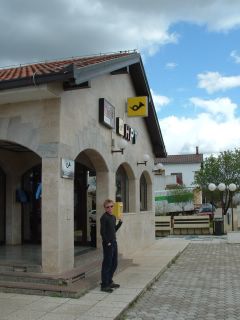
The Den of evil....
So, now that it’s been properly introduced, I should define it, but, unfortunately, the essence of Deconstruction is that there can be no definition―now, do you see why people hate it?―but I can present some of the reasoning behind it:
· Establishing a system of differences is necessary to have understanding.
· Language is no more than a system of differences, which means a saxaphone is what it is because of what makes it different from everything else.
· The context in which language is used is where its definition comes from, but the context can never be fully defined, thusly, the words can’t be fully defined.
· After the system of differences is established, one has to be re-educated, in a sense, to recognize that the comparisons that have been created are now the instrument to be “played.”
Take for instance what is considered to be the first authentic art-form born in the most diverse nation in the world, jazz, and think of it as language. As Wynton Marsalis said in Ken Burn’s documentary Jazz, it allows musicians to “speak to each other in the language of music.” He couldn’t be more correct. Jazz is simply deconstruction put to music. It’s often considered the hardest music to play, and most people think it’s because the structure is so complex. As a musician, however, I see jazz simply as taking those structures and saying, “Don’t worry too much about those,” which, in turn, is perhaps the most complex of structures.
Now, that said, considering the ideology of deconstruction, it’s not really a new concept. One can go back to Kant or Locke and find many of this same sort of thought in their writing. Furthermore, we so often look back in history to certain geniuses―Da Vinci,
It is this idea in broad truth that leads me to believe what I said once in class when trying to explain my idea of difference, or the lack thereof. It’s not that I don’t recognize that culture will influence the actions of a person, rather it’s that I see those cultures as a response to the exact same things that created my culture—and that’s not a Freudian survival idea, it’s more of what Edward Said argued in Orientalism. To look at it in that way doesn’t ruin objectivity or create relativism. All it does is shift the focus from the what of culture to the why.
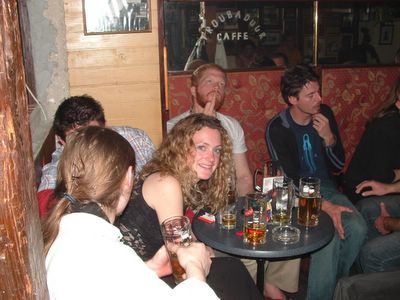
Some time with the Troubadours

That is why I travel. I like to see the way people in different regions of the world react to life. How do they represent the feelings and ideals we all have? How do they explain the past? What symbols or expression do they use? Not, what is there in that place? The latter question is my reason for bringing up our trip to
Both Arlin and Tim—Irish and South African, respectively―looked at me uneasily. We were in a jazz bar called the Troubadour in a place that was torn apart less than ten years ago by overt and violent nationalism. Arlin cleared her throat, and said, “Robert, you better be careful. Patriotism is damn dangerous thing. Look at what it did to my country.” Tim sat next to her nodding. It had never crossed my mind to look at it that way, but there is an implicit “us” verses “them” idea in patriotism. I mean it did take the attacks to pull “us” together.
Even if it is not a battle, it is always “us” and “them.” In war, people say, “We did this or that,” whether or not that person was a part of it. Furthermore, when I tell people I think patriotism is dangerous, they, more often than not, scoff at me for being an

Pan of Dubrovnik, Croatia
We need to stop looking for what defines us and realize that everything we cite in differentiating ourselves is actually what makes us similar. Language is not tantamount to communication. Par exemple, si je dirais quelque chose en français, vous, peut-être, ne comprendriez pas, mais, quand même, ça ne vous dire pas que je n’ai rien expliquer. That’s why I think that jazz had the unifying effect that it did. People came together and created something that transcended words, and the result was something that broke barriers.
For fear that I would seem naïve or that I am making mountains out of mole-hills, I had wanted so badly to show ancient art and music from different areas, present a history of the development definition in the 18th century, show the effects that physics and chemistry had on literature, and explain place in religion, showing the problems it presents. I want to discuss the similarities between the chi in Taoism and the Holy Spirit in Christianity. However, I think I may have to accept the fact that words alone will never be able to explain how one perceives the world, and I can only hope that one day, if I’m right, I can find a way to express it.
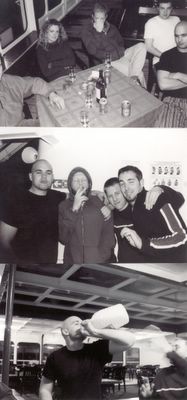
The myth of progress
Here's a random thought: there is no such thing as scientific or technological progress. Human knowledge of both science and technology is broadened only by the recognition of what is already there. Look at any great “invention,” and it is clear that nothing was actually invented or created. In fact, the only thing that was ever invented was the idea of invention. Computers were not created; they were the product of a combination of realizations: the existence of electrons, the manners in which they can be manipulated, the conductive properties of silicon, and so on. Therefore, humans do not create; rather we work with what already is.
It may seem trivial to mention this, but in an age where almost everyone gets their food from a supermarket, almost all products are factory-made, and scholarship has been broken into subcategories which leave science to scientists and politics to political philosophers, it doesn’t seem too foolish to presume that this principle is less easily recognized than it once was. As a result, there is an unstated idea that humans are creating, developing, and progressing to combat the effects nature has on mankind, when essentially we are (or were for a period) coming to understand nature and how to work with it in order to better our lives.
We as people, however, in our language concerning how we come understand nature, tend to label what is new to us as “progress.” As a result, we quantify progress with statistics: longer life-spans, more broad access to information, more efficient means of transportation—yet we often remain ignorant to the fact that life, by and large, remains unchanged. By this I mean, the most significant problems of humanity have not yet been fixed by our so-called progress: war, famine, poverty, disease, ignorance, etc.
Bill Hicks, the famous comedian-philosopher of the early 90s, said in reference to the first Gulf War:
You know, that’s pretty incredible watching missiles fly down air vents―pretty unbelievable―but couldn’t we feasibly use that technology to shoot food at hungry people? You know what I mean? Fly over Ethiopia―there’s a guy that needs a banana! [Hick’s makes the sounds of a missiles being fired, then pretends to be an Ethiopian waving at the planes as they fly past] The stealth banana. Smart fruit.[1]
I don’t care how absurd it may seem to use a quote like that to exemplify my point, but I believe that it is just that simple to show how “progress” doesn’t mean change. The issues that have plagued humanity for so long are just as prevalent with stealth technology as they were with the discovery of gun-powder or the creation of the bow and arrow. In many respects, all of what “progress” denotes is that we are now more efficient at perpetuating these problems―kill faster, more precisely, etc.
The timelessness of Hicks’ quote only exemplifies the lack of improvement we really do experience. For instance, he goes into a talk mocking the “coalition,” jokingly parodying the talks between England and the US―the “coalition of the willing” if you will―yet despite the fact that over a decade has passed, no one would ever know that he wasn’t talking about the second Iraq war. This should disprove any ideas in progress.
Therefore, if progress is an illusion, the belief in this illusion is dangerous, because it destroys nothing but the possibility of true advancement. To remove the purpose of advancing science and technology from the ostensible technology or scientific knowledge which are “advanced” is to forfeit the possibility of accomplishing the goals that these things should bring about.
In a sense, there is no tangible technology that could produce real advancement. Technology and science must first be coupled with the ideology that its purpose is to address the realities of humanity that cause the problems it is trying to fix. With this approach the permanent eradication of poverty must first establish its goal as addressing the causes of inequality, not with simply giving poor people money or taking money from rich people, just as the end of war should not be seen in the light of how “we” can better protect ourselves from “them” or how could this war be ended, rather it should tackle the question of why and how one arrives at the belief that killing another will best serve him in the long run―and, furthermore, understanding the interconnectedness of it all: poverty, disease, war, famine, etc.
This is so very clear as regards disease―something that I see all too clearly, even if perhaps I have trouble explaining it. My most dear friend has a disease, Cystic Fibrosis, which only affects a small number of people within one racial group―people of European origin. I don’t mention this for pathos, but rather to establish my reason for even knowing, because, to be honest, I wouldn’t know or worry too much about it if I didn’t have this connection, which illustrates my point. Cystic Fibrosis is only of minor importance because of the amount of people it affects, not for the effects it has on the people who have it.
As a result of this viewpoint, the cure, which has been envisioned, cannot be realized due to the profitability of both the disease itself and the relegation of profit once the disease has been cured. I bring this up not to imply that we should expect pharmaceutical companies to stop considering profit in regards to curing diseases, but to show that we don’t look at curing diseases by understanding first the body. Essentially, what I wish to say is that there is more to CF than coughing, mucus build-up, etc. CF has a history and an impetus which must be taken into account―it is not simply a medical issue.
In a letter written in the late eighteenth century, Lady Mary Wortley Montague describes her discovery of a small pox vaccine during a stay in
Because the cure isn’t sought as a means to ending disease but a means to profit is why this is still true today with men like Dr. Richard Boucher at UNC Chapel Hill who have had to start company after company to try to push his findings on Cystic Fibrosis[2] through the FDA―an organization which is a whole different discussion in and of itself. Drug companies will not support Boucher because the profitability of the cure is less than the cost of development.[3]
I truly believe that if there was a realization that “progress” as we see it now―using science and technology as its proof―actually hurts our ability to truly advance, then we would see sweeping changes for the better as pertains to our society. Perhaps, I should say we would see change as we have never seen it before, because our “intellectual foundation” could be built on curing the literal and figurative diseases of humanity, not just the symptoms. On thing hit me recently, and I'll close with it:
Sunday, May 01, 2005
Nonsense and language

La vie sera tout jolie....
People are interesting. I hate to state the obvious, but we're all people, yet we spend most of our time trying to figure "people" out. Not just other people, but ourselves.
Jacques Derrida said, "I have one language, and it is not my own." Which is a good place to start a talk about language, because Derrida didn't say that at all. He said, "Je n’ai qu’une langue, or, ce n’est pas la mienne." What's that mean? Why the hell do I care? It's actually far more important than most people realize, especially those who speak one language.
When we study Romantic literature here in the States, we learn a term called a "romantic conceit." Take, for example, Frederick Douglass talking about the slaves' singing
[these songs] told a tale of woe which was then altogether beyond my feeble comprehension; they were tones loud, long, and deep; they breathed the prayer and complaint of souls boiling over with the bitterest anguish. Every tone was a testimony against slavery, and a prayer to God for deliverance from chains. The hearing of those wild notes always depressed my spirit, and filled me with ineffable sadness. I have frequently found myself in tears while hearing them. The mere recurrence to those songs, even now, afflicts me; and while I am writing these lines, an expression of feeling has already found its way down my cheek. To those songs I trace my first glimmering conception of the dehumanizing character of slavery...If any one wishes to be impressed with the soul-killing effects of slavery, let him go to Colonel Lloyd's plantation, and, on allowance-day, place himself in the deep pine woods, and there let him, in silence, analyze the sounds that shall pass through the chambers of his soul,--and if he is not thus impressed, it will only be because "there is no flesh in his obdurate heart."
I met a beautiful Taiwanese girl named Fanfan last year when I was studying in Angers, France. We spent a lot of time together. We had two classes together, and we came to be in the same "group" of friends. In spite of the time we spent together, we never ended up having any very long, profound conversations, because we were learning French together.
Something happened, though, and we gradually started writing to each other more often, until we were talking in some form or another everyday (thanks to the internet, we can talk, "chat," write, etc.). We were both teaching each other French, though it was neither of our native tongues.
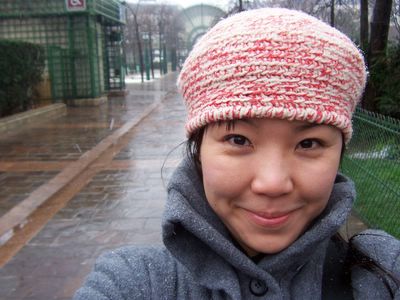
Fanfan was/is living in Paris, and I was/am at school in the states. At first, I would come home every afternoon at about 5, and we would talk for several hours, without a pause. Gradually, as this was happening, I started to realize that I was in love with her. I couldn't stop thinking about her.
Not only that, she made me relax. She just smiles at me and starts laughing whenever I go on some diatribe about the CIA is probably using ECHOLON to read everything we wrote to each other (just a hypothetical, not an actual example....I'm not paranoid......[I'm just saying that in case their reading my blog]). Immediately, though, I relax. Which is good for me.
I take things too seriously.
I didn't want to say anything to her, because first of all, what difference did it make when there was 3000 miles of ocean between us, also, she had told me several times that all of her male friends would always end up one day coming out and telling her that they were attracted to her. I didn't want to be another one of those guys. I figured it was better to keep her as a friend then freak her out by telling her that I couldn't stop thinking about her, and never talk to her again as a result.
One day, though, we were joking about someone else saying that they loved me, and she said, "You know what? I love you, too." (in French, obviously). I didn't know if she was joking or not. I was treading on thin ice....
"Tu rigole?" I asked.
"Non," she said.
That was probably the most bittersweet moment of my life. The "sweet" part is pretty obvious...and the "bitter"? A little bit a water that some might call the "Wide Sargaso Sea."
We talked for a long time about it....for instance, about what the hell were we going to do, which was, ultimately, nothing more than keep talking to each other until we could be together again.
Well, as exciting as I'm sure this is for all of you, I'm going to cut to about two months later. It was about three days after Christmas, and we were both getting very frustrated. We were still talking every day, but we wanted to see each other again, we had never actually been spacially "together" since we had realized how we felt. Not to mention, I was very frustrated with the "Debutante" Balls (something even most Americans don't even understnad, myself included, so I'm not going to try to go into it) that I had to go to for the duration of the whole break.
So, it was two o' clock in the morning, and I was looking for a plane ticket to Paris. I was pretty fed up with everything, and I needed to travel again. Well, by an act of God, I found the absolute cheapest ticket to Paris in the history of air travel, and it was leaving the following Monday.
I bought it, of course.

(This part's embarassing, but I'm going to put it out there. It's important for the story) Earlier that same night, I had tried to play a song for her that I had just written but our connection wasn't good and it kept cutting-off, so, after I bought the plane ticket, I wrote her, saying:
La petite jolie follie,
Je pensait un peu, et je m'ai dit, "Peut etre la
semaine prochaine je chanterai pour elle a Paris.
P-quoi pas?"
.....Je ne plaisante pas.......
Donc, je viens d'acheter un billet a Paris.
J'arriverai le 3 janvier (dans une semaine) et
partirai le 11 janvier.
Je n'ai jamais fait qqchose comme ca. J'ai trouve un
billet qui coute 100 dollars moins cher que tous les
autres que j'avais vu. Je voullais faire certaine que
tu seras d'accord, mais ta numero de telephone est a
Clemson, donc j'ai pas le moyen de te contacter plus
vite, et j'avais peur que le billet sera achete avant
je t'affirmerai......
J'espere que t'es d'accord.....
Je t'aime...
Je t'embrasse comme la semaine prochaine,
Ta carote*
Thus, this is where the picture from under the Eiffel Tower comes from.
Well, it's all history from there. We talk, still, on and off every day: I talk to her when I wake up and she's coming home from work, I wake her up in the morning to talk before I go to sleep, etc. We both have webcams now (I hate saying that), which we leave on all day so that at least we can pretend like we're together. Even if we're working, we can at least see the other and gaurd the illusion that we're working side-by-side.
This is the importance of the whole issue. You will never understand language until you see how flawed it is. So, the answer to the second depends on what you mean by communicate. Fanfan understands what I'm trying to explain better than anyone else I know (and that's not one of those lovey-dovey, "She knows my heart" type thing that one would say at a slumber party while fluttering his eyes). How is that possible if we're both speaking in our second languages (actually, technically, her fourth)? I honestly believe part of it is that we can't get caught up in all the technical nuts and bolts of language, we can only communicate the big picture. It's like jazz with language, we play language like a band plays jazz. Sure, it sucks sometimes when we are trying to communicate some certain particular thing, but it's never something serious.
But that's not it...
Technically, we don't speak in French with each other. We mix English, French, Japanese, and Chinese (all of which she is either fluent in or at least has a basic knowledge of, in the case of Japanese). We have whole conversations that a French person would never understand. The quote at the top, "La vie sera tout jolie," is a prime example. Translated directly, that would say, "Life will be very pretty." It is something that has come to be a part of "our" language, that comes from something I used to say a lot in Angers, "La vie est jolie," only because I like the way it sounds more than "La vie est belle."
Well, it goes further than that. I know that people question whether Fanfan and I are realistic in thinking that something could ever work out between us. She is from Taiwan, and I am from the US. Our countries are seperated by the breadth of the US (I live on the east coast) as well as the largest ocean in the world. She speaks Chinese, I speak English. We both have families in our home countries. etc. etc.
And, finally, a resounding, you yourselves are different.
Some of the other questions are valid, like, for instance, if Fanfan and I are together for a long time, I don't know how we'll approach seeing our families as much as possible. However, it is that last point that I've been essentially addressing the whole time. This argument, that we are different, is completely, unrealistic. We may be idealists, but we know better than most the truism that denies difference among people. To percieve the individual through a lens of their culture is to deny that person humanity.
If the belief is that two individuals from different cultures can't live together, then, whether or not it is realized, the belief is also one which says that groups of people from different cultures cannot live together harmoniously, which absolutely negates the idea of America's "melting pot."
Unless, however, you believe that Americans somehow transcend the label of culture as soon as they become citizens, which is still a generous summary concerning many would consider a lot of those not born in the US as not being truly American.
This is by no means just an American thing. I've seen it in a lot of different countries. It's just easier, being American, to analyze the situation here.
If you're still not getting how this ties back into language, think of what difference is in regards to language and, even more, to human understanding? How do you know what a tree is, for instance? You know because of what makes it different from everything else you know. Therefore, difference is a necessary part of human understanding and consequently (which is to say, language did not precede human understanding, it is a means which humans created to communicate this understanding) it is programmed into language. However, once the system of differences is established, one has to be reminded that the differences were created in order to understand, and if they aren't then one begins to believe in the differences.
All cultures develop as a reasult of the same human conditions (birth, life, and death) and the same questions (religion, afterlife, etc.). They are different manifestations of the same effects whose causes are all the same, and just like with spoken language, to believe in the differences among expressions found in the different languages of culture, is to believe in a difference that is, in fact an illusion.

This is why Fanfan and I don't have problems communicating. We don't believe in the differences which we create in order to understand.






